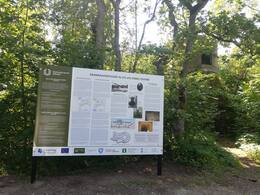Baterijos vado Aleksandro Stebelio likimas.
Legendinio baterijos vado, kapitono Aleksandro Stebelio, likimas gaubiamas paslapties.
Pagal oficialią versiją, jį sugavo vokiečiai ir sušaudė Valgos kalėjimo stovykloje. Tai buvo padaryta ypač žiauriai: Stebelis buvo apipiltas vandeniu esant minusinei temperatūrai ir mirtinai sušalo. Pagal kitą versiją, Servėje kalintys politiniai darbuotojai, persirengę paprastais kareiviais, kalėjimo stovykloje pradėjo muštynes, kurių metu Stebelis žuvo. Prieš kelis dešimtmečius dar buvo gyvų karo laikų piemenų berniukų, kurie teigė, kad politiniai darbuotojai nužudė tarp berniukų populiarų Stebelį prieš jam pabėgant iš Mõntu, nes nenorėjo palikti savo vyrų. Jo kūnas buvo palaidotas Karuste kaimo akmenų sode. Mažiausiai tikėtinas gandas atrodo, kad Stebelis nelaisvėje bendradarbiavo su vokiečiais, išgyveno karą ir mirė natūralia mirtimi.
Tõnu Veldre pokalbiai su vietos gyventojais 1998–2000 m.
Susijusios vietos
Stebelio pakrantės apsaugos baterijos Nr. 315 vadavietė
Šis pakrantės gynybos baterijos vadovavimo centras yra dabar apleistoje Sääre kaimo dalyje.
Pakrantės gynybos baterija buvo pavadinta jos vado kapitono Aleksandro Stebelio vardu. Statybos prasidėjo 1940 m. gegužę, o baterija buvo baigta prieš pat Antrojo pasaulinio karo pradžią. Baterija atgrasė vokiečių jūrų pėstininkus Lõu įlankoje ir dengė Raudonosios armijos Lõpe-Kaimri gynybos liniją. Artilerija buvo sunaikinta Raudonosios armijos atsitraukimo metu 1941 m. spalį, po to apatiniai barbetų lygiai buvo užlieti. Kompleksą sudarė dvi artilerijos barbetės su dviem 180 mm pabūklais, vadovavimo centras, vėjo malūno formos ugnies valdymo bokštas, generatorius ir katilinė.
Deja, šios intriguojančiai suprojektuotos baterijų pozicijos yra privačioje teritorijoje ir jas sunku rasti. Todėl visiems susidomėjusiems teks tenkintis apžiūra į vadovavimo centrą iš išorės, nes jo apatinis lygis yra apsemtas. Centras buvo nusausintas 2010 m., bet vos po kelių mėnesių vėl prisipildė vandens.





